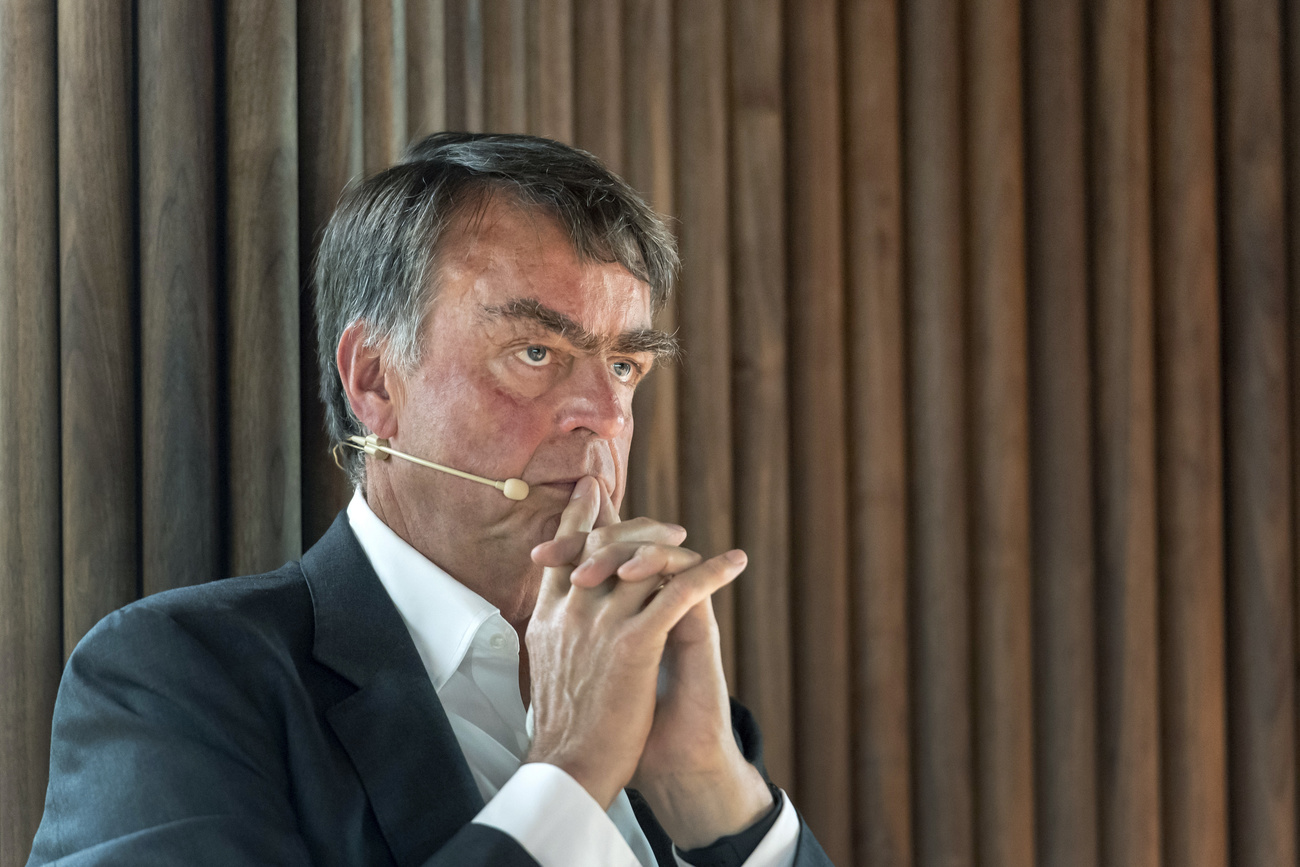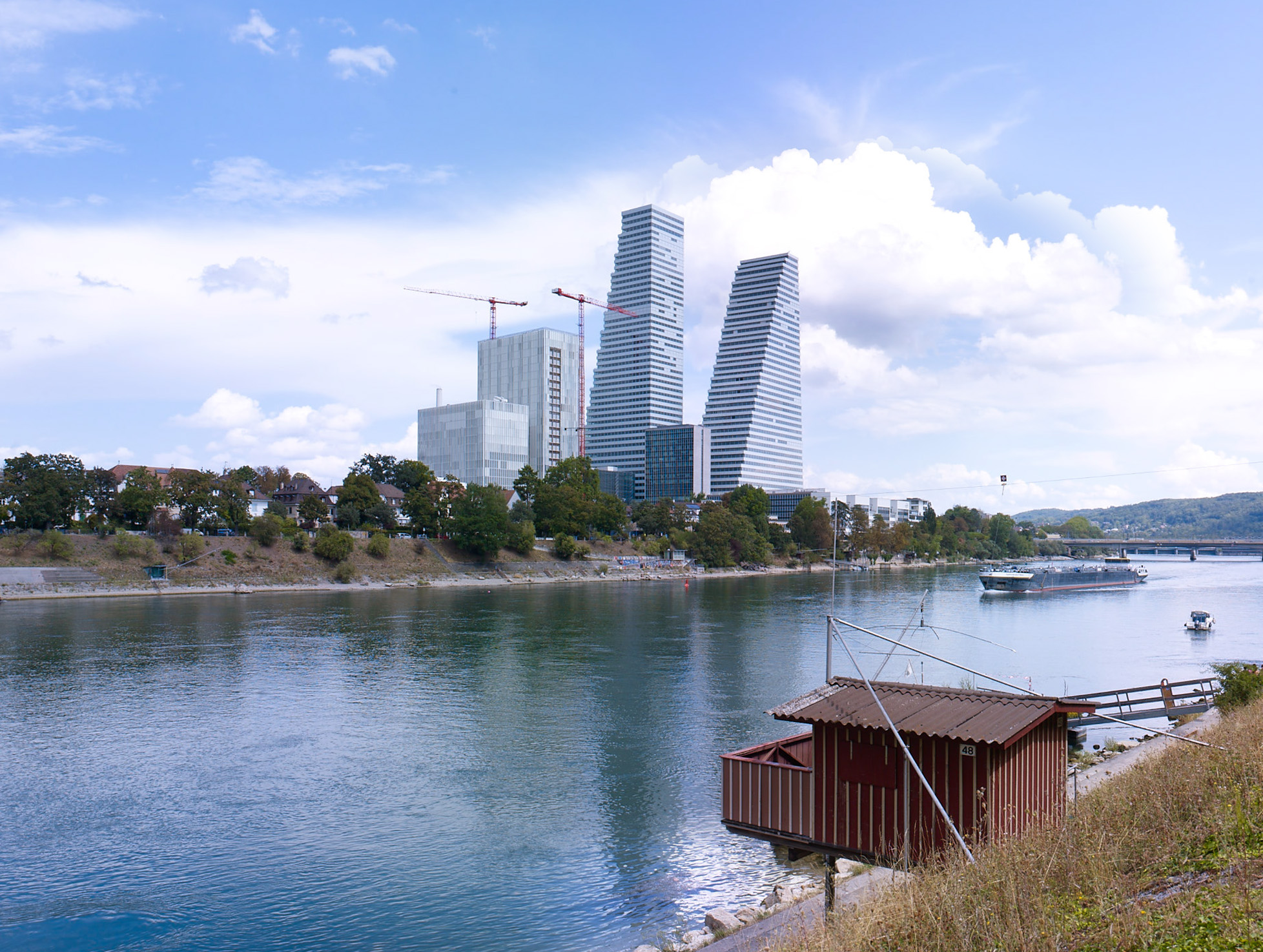Roche descendant André Hoffmann on pharma, feuds and family business

André Hoffmann sits more than 400 places below Elon Musk in Bloomberg’s Billionaires Index. His net worth is estimated at just under $7 billion (CHF7.7 billion), against the $450 billion attributed to the world’s richest man.
If anything, the gap understates the gulf between the soft-spoken, beetle-browed Hoffmann, who is the great-grandson of Fritz Hoffmann-La Roche, founder of pharmaceuticals group Roche, and the noisy SpaceX creator and X owner. “The arrogance of these guys knows no limit,” grumbles the 66-year-old Hoffmann about Musk and his assumption, shared by many of his fellow Silicon Valley entrepreneurs, that he knows how to change the world single-handedly.

Hoffmann has been vice-chair of Roche since 2006 and a board director since 1996. Among many other roles, he is a trustee of the World Economic Forum, whose annual summit takes place in Davos this week, and co-founder of InTent, a platform for developing sustainable solutions to societal problems.
Hoffmann advocates for the power of business to work towards the common good, in partnership with government, regulators and other stakeholders. “It’s together doing something for the commons, rather than ‘I’m going to bypass you to make more money’ or ‘you’re going to stop me because I make too much money’,” he says in an interview. “We need a different approach.”
His background has made him a firm believer in the value of family businesses, and a source of wisdom in the dilemmas family owners face, such as whether to serve as operational managers, or – the approach adopted at Roche – to step back and exert pressure from the board and as investors.
As a vocal backer of environmental, social and governance initiatives, Hoffmann is the epitome of what Musk and US president-elect Donald Trump would decry as “woke” capitalism.
“I define myself as an idealist, and I would say that the couple of days after [Trump’s victory, it] was really quite difficult to pick [myself] up. This is a knockout,” says Hoffmann, speaking a few weeks after November’s US election. “Fifty-one per cent of Americans feel that a corrupt old man is going to make their life better? I’m sure it’s not true.”
‘Let’s try to be pragmatic’
Even though he believes that those gathering around Trump are “not good people”, Hoffmann maintains a businessman’s determination to navigate through the changed landscape.
Trump policies, in particular the nomination of vaccine sceptic Robert F Kennedy Jr as head of the US Department of Health and Human Services, could have unpredictable consequences for Roche. But Hoffmann says “Mr Kennedy might simplify the FDA [Food and Drug Administration] procedures. Maybe there is something there where we can help to create something that would serve the patient better. Change always provides opportunities, so let’s try to be pragmatic about this”.
He adds, still in shock: “This is somebody who denies the power of vaccines, being in charge of public health. I’m sorry, I didn’t think I would see that in my life.”
Hoffmann’s conviction that business can and should be directed towards expanding the world’s human and environmental capital, and not just its financial capital, was inspired by his own experience. For many of the last decades of the 20th century, descendants of the Swiss company’s founding family maintained a deliberately hands-off attitude, disparaged by managers of the group as passive Glückspilze or “lucky mushrooms”, feeding off their good fortune. During that period, Roche was at the centre of a number of ethical and environmental breaches, from the catastrophic emission of dioxin that polluted the northern Italian town of Seveso in 1976, to the vitamin price-fixing scandal of the 1990s.

More
Roche heirs bid goodbye to ‘unsustainable’ philanthropy
The trigger for change was an unexpected approach from rival Swiss drugmaker Novartis in the early 2000s. The family’s first reaction was: “We’re being besieged here and we shouldn’t tolerate that,” says Hoffmann. Then he and his relatives realised they “didn’t really have a vision for the business”.
Positive purpose
In his recent book, co-authored with Peter Vanham, Hoffmann explains how the family worked to tighten up oversight. New board committees were set up to underline to management that the family was serious about the company’s identity. The family articulated to the managers a new positive purpose, encapsulated in Roche’s mission of “doing now what the patients need next”.
The book expands on the theme, laying out how Roche and other companies, such as Schneider Electric and cement maker Holcim, have tried to promote a long-term vision of sustainable and inclusive profitability. In particular, the book focuses on how business can work with rather than against nature. The Financial Times’ review drew fire on LinkedIn from one strategy consultant whose firm had worked with Roche. He dismissed the book as “the work of a limousine liberal [feeling] guilty about his heirs’ past deeds” and claimed Roche was really turned round by its then chief executive Franz Humer.
Hoffmann responds: “The family influences but doesn’t do. He [Humer] did. And you know, we are very grateful for that.” Humer and Hoffmann’s father, Luc, a conservationist who co-founded the World Wildlife Fund, were close. Hoffmann points out that the “intimacy between the family and management” might be one way in which they reconciled their different roles.
But being a family influencer rather than a management doer is subtle and difficult. Hoffmann illustrates the point with a current dilemma about the pressure on Roche to reduce the use of persistent organic pollutants in the drugmaking process. “It’s not easy to put through. André Hoffmann walking in on his white horse and saying ‘from now on you don’t pollute the world anymore’ is a joke. That’s not how it happens. So when we talk, we put in evidence, we come back and we talk again and we try to move that forward.”

More
Office towers go higher, bigger, greener – but what’s the point?
Long-term perspective
This style is having positive results, Hoffmann says, but while “the pockets where we are not best in class are diminishing … they’re still there”. The approach also does not satisfy environmentalists he works with, who would like the family, which controls a majority of Roche shares, to push harder for wholesale change. “I think that’s probably a little bit over ambitious,” says Hoffmann quietly.
He takes a long-term perspective and points out that the family-owned model “is the norm” worldwide. The Family Business Network, an organisation of 4,000 families, has estimated that family-controlled businesses account for 70% of global GDP and employ 60% of the workforce. Most entrepreneurs, Hoffmann adds, have the opportunity to maintain family control, unless they float the company or sell to financial buyers.
But he says: “I don’t believe family business is the better model. In fact, it can be diabolical, if you suddenly start hating your cousins or hating your nephews. There’s nothing that can rescue that … and I’ve seen a number of these bloodthirsty feuds”.
Similarly, there is no rule that family businesses will always set a positive vision or purpose.
Hoffmann is often approached by frustrated younger family members who want to change their company’s strategy to do more for nature, against the will of their parents.
Sometimes the parents give a chunk of the family fortune to their children in order to expand philanthropic activities. “That’s not the way to do it,” says Hoffmann. Instead, he tells the heirs: “If you run a business and avoid thinking about climate risk, or biodiversity loss risk, or the social inequality risk, or the unhappiness of the people who work with you, you are not running it in a very professional way … You are fighting for the survival of your business. If the old generation ignores these sort of threats, they are running a very risky business. That’s where you can make a difference as a young generation … You see things that perhaps they don’t.”
Copyright The Financial Times Limited 2025

In compliance with the JTI standards
More: SWI swissinfo.ch certified by the Journalism Trust Initiative








You can find an overview of ongoing debates with our journalists here . Please join us!
If you want to start a conversation about a topic raised in this article or want to report factual errors, email us at english@swissinfo.ch.